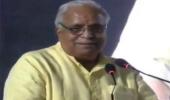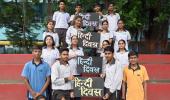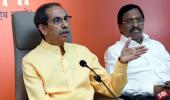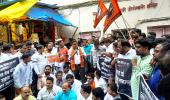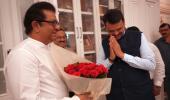'I don't know whether the top Gujarati leaders of Indian politics (Prime Minister Narendra Modi and Union Home Minister Amit Shah) in Delhi realise that the narrative of Hindi‑Hindu‑Hindustan will eventually destroy their own language too.'
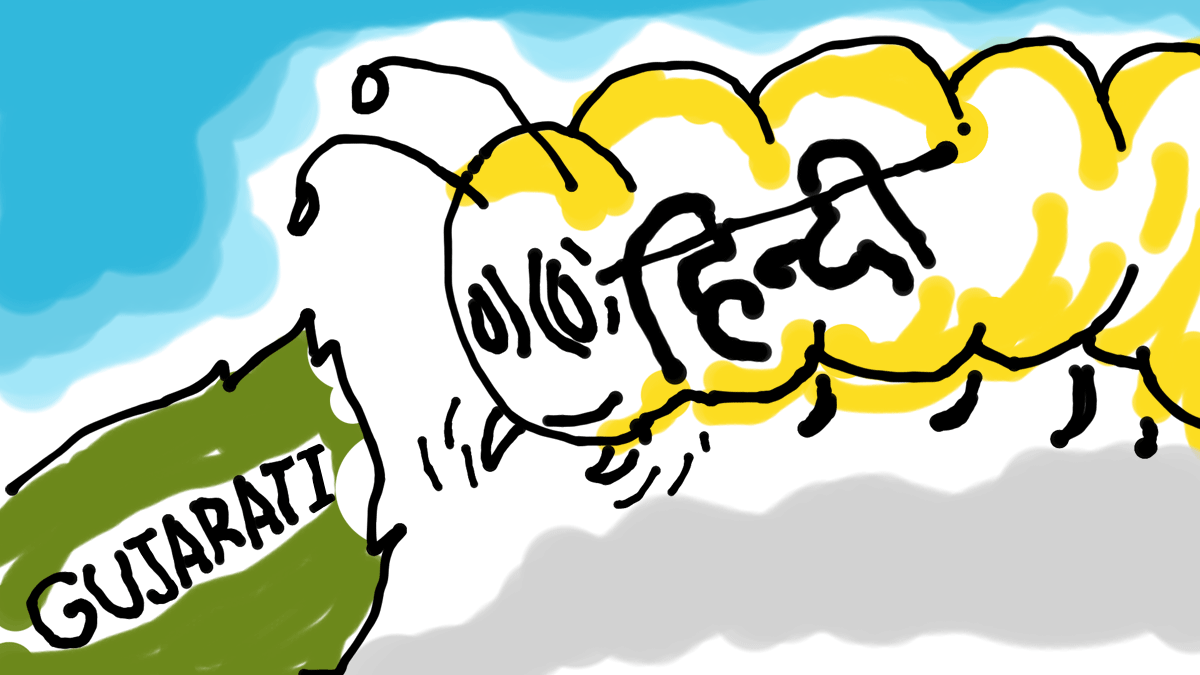
As the controversy over the imposition of Hindi brews and the Maharashtra government issuing an order to teach Hindi 'generally' to Class I to Class 5 students who learn Marathi and English, its impact is being felt far beyond Maharashtra's urban centres.
"If you say you have to develop Hindi as the sampark bhasha -- the contact language -- then it is not the responsibility of Maharashtrians to develop Hindi. It's the responsibility of the cow belt. They should take care of their language," Dr Deepak Pawar, president, Marathi Abhyas Kendra, tells Prasanna D Zore/Rediff in the second part of an in-depth interview.
Has the anger against imposition of Hindi and Maharashtrians losing employment opportunities because of this limited only to urban areas or has it percolated into rural Maharashtra?
No, this is no longer localised. Earlier, in the Shiv Sena's early days, it was mostly urban. But now if you go to Konkan, Marathwada, or western Maharashtra, you'll find sisable North Indian penetration (and a feeling of anger and alienation against non-Maharashtrians).
In the wider MMR (Mumbai Metropolitan Region) -- Thane, Raigad, Palghar -- you'll find significant North Indian pockets. So the anger is spread across geographies and economic classes.
Could this issue have emotional appeal with the electorate, especially with upcoming municipal elections in Mumbai as well as other MMR regions and other urban centres in the state?
Yes, there are people who say the timing of the GR (government resolution which was issued on April 17) is suspicious -- that it's meant to polarise Marathi versus non‑Marathi votes (the Maharashtra government now has issued an order on June 17).
And considering how Raj Thackeray has shifted his stance multiple times, people view all this with suspicion.
But beyond Raj Thackeray -- even if he reverses his statement -- the public is extremely angry. If you look at social media, you'll see that people perceive this as complete encroachment on the Marathi linguistic space.
So, electorally, yes, it could cause polarisation. But the public also needs to look beyond that and consider how to create a wider, post‑Shiv Sena, post‑MNS narrative for Marathi language and Marathi manoos politics.

Which political parties could this Marathi versus non‑Marathi voter polarisation benefit?
The BJP is in a highly advantageous position in Maharashtra (electorally and politically).
Given their recent electoral performance and brutal majority, they will leave no stone unturned to win the Mumbai municipal corporation elections.
But it's not just about polarisation. It's about the kind of political economy we want for Mumbai, the MMR and the rest of Maharashtra. This polarisation could eventually reverse what was achieved through the Samyukta Maharashtra movement in 1956-1960.
Why is it that people in Maharashtra feel they will be dominated by Hindi and north Indians? Where is this fear coming from?
See, one reason is very clear. A sisable number of Maharashtrians understand Hindi not because it has been taught in schools, but because of cinema and now Web series. The dominance of Hindi in Mumbai comes from Bollywood, which was born in Mumbai and prospered here.
More importantly, if you look at the school syllabus pattern -- if you're going to have three compulsory languages -- then you're going to cut down on something.
So what is the government planning to cut down? Maybe social sciences, because no one would want to replace science or math. So we will end up creating a non‑critical society.
We'll be creating a typical WhatsApp University society, which understands the world through gossip, not through critical analysis.
Most importantly, people should understand that the Hindi we are talking about is actually made up of Bhojpuri, Awadhi, Bundelkhandi, Khadi Boli, Magahi, Braj, and other languages. It's only through the politics of the Census that Hindi has become so dominant in Maharashtra and India.
It's the politics of the Centre and the politics of the Census. People may speak Bhojpuri, but when the Census officials come, they report their language as Hindi -- because that's what they've been instructed to do.
I work with a platform called Campaign for Language Equality and Rights. Many people from Uttar Pradesh and Bihar have said that Hindi has brutally murdered their dialects and languages.
So what Hindi did to these dialects in the 16th century and thereafter, Hindi is now doing to Marathi.
And it will soon destroy Gujarati as well. I don't know how many Gujaratis understand this. Maharashtra is a big state; compared to that, Gujarat is smaller.
Once Hindi destroys Marathi, the next number is that of Gujarati. I don't know whether the top Gujarati leaders of Indian politics (Prime Minister Narendra Modi and Union Home Minister Amit Shah) in Delhi realise that the narrative of Hindi‑Hindu‑Hindustan will eventually destroy their own language too.
The National Education Policy 2020 emphasises that no language will be imposed. Why then has the Maharashtra steering committee advanced a policy that appears to contradict this principle?
I spoke to a member of the steering committee, a renowned educationist. He told me that this issue was not even discussed in the Sukanu Samiti or the consultative steering committee (which was formed to guide and oversee the implementation of the National Education Policy 2020 in the state, particularly within higher and technical education).
And this steering committee came into existence before the Maharashtra assembly elections of November 2024. If the steering committee discussed this particular issue before the elections, and some members supported this, then they should be named and shamed -- for creating survival issues for the Marathi language.
This (Hindi imposition) is bulldozer educational politics.
Who would you blame for this bulldozer educational politics?
If you say you have to develop Hindi as the sampark bhasha -- the contact language -- then it is not the responsibility of Maharashtrians to develop Hindi.
It's the responsibility of the cow belt. They should take care of their language. They are not able to provide employment to their own people; they come here, and then for their benefit, we want all children to learn Hindi.
I think this is completely preposterous. The chief minister (Devendra Fadnavis) and Education Minister (Dada Bhuse from Eknath Shinde's Shiv Sena) should withdraw this anti‑Marathi notification at the earliest.
